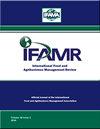HelloFresh过渡到无塑料的未来?
IF 1.5
4区 经济学
Q3 AGRICULTURAL ECONOMICS & POLICY
International Food and Agribusiness Management Review
Pub Date : 2024-02-01
DOI:10.22434/ifamr2023.0068
引用次数: 0
摘要
近年来,HelloFresh 的包装方式因其成功扩张而备受关注。由于原料过度使用塑料包装,客户取消了他们的套餐订购。为了应对这些事件,HelloFresh 开始寻求替代塑料包装原料的方法,但最终发现现有的包装技术不可能完全消除塑料包装。因此,HelloFresh 正在寻找与客户交流可持续发展信息的方式,以及他们在包装工艺上进行创新变革的行动,以实现成本效益、保持食品安全并促进包装方面的可持续发展。在包装材料可持续发展转型的现阶段,还没有现成的解决方案,因此,HelloFresh 必须在转变其包装做法,使其更具可持续性和向客户有效传达这一信息之间取得平衡。本文章由计算机程序翻译,如有差异,请以英文原文为准。
HelloFresh: Transitioning to a plastic-free future?
The packaging practices of HelloFresh have come under scrutiny in recent years as a result of the company’s remarkable expansion success. Customers have cancelled their meal-kit subscriptions due to the excessive use of plastic packaging for ingredients. In response to these events, HelloFresh began to seek alternatives to replace plastic packaging for its ingredients, but ultimately found that the currently available packaging technology makes it impossible to eliminate plastic completely. HelloFresh is therefore looking for ways to communicate with customers about its sustainability message and their actions to be cost-effective, retain food-safety, and foster sustainability with regard to packaging while making innovative changes in its packaging processes. In the current stage of the sustainability transition for packaging materials in which no ready-at-hand solutions are available, it is crucial for HelloFresh to strike a balance between converting its packaging practices to be more sustainable and communicating this message effectively to its customers.
求助全文
通过发布文献求助,成功后即可免费获取论文全文。
去求助
来源期刊

International Food and Agribusiness Management Review
AGRICULTURAL ECONOMICS & POLICY-
CiteScore
2.90
自引率
0.00%
发文量
0
审稿时长
>12 weeks
期刊介绍:
The IFAMR is an internationally recognized catalyst for discussion and inquiry on issues related to the global food and agribusiness system. The journal provides an intellectual meeting place for industry executives, managers, scholars and practitioners interested in the effective management of agribusiness firms and organizations.
IFAMR publishes high quality, peer reviewed, scholarly articles on topics related to the practice of management in the food and agribusiness industry. The Journal provides managers, researchers and teachers a forum where they can publish and acquire research results, new ideas, applications of new knowledge, and discussions of issues important to the worldwide food and agribusiness system. The Review is published electronically on this website.
The core values of the Review are as follows: excellent academic contributions; fast, thorough, and detailed peer reviews; building human capital through the development of good writing skills in scholars and students; broad international representation among authors, editors, and reviewers; a showcase for IFAMA’s unique industry-scholar relationship, and a facilitator of international debate, networking, and research in agribusiness.
The Review welcomes scholarly articles on business, public policy, law and education pertaining to the global food system. Articles may be applied or theoretical, but must relevant to managers or management scholars studies, industry interviews, and book reviews are also welcome.
 求助内容:
求助内容: 应助结果提醒方式:
应助结果提醒方式:


